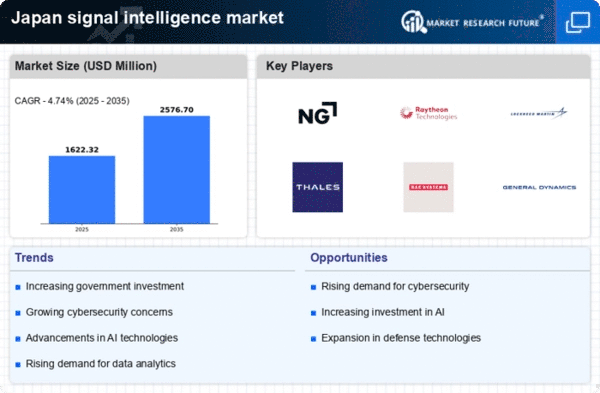Increased Focus on Data Privacy Regulations
The signal intelligence market in Japan is increasingly shaped by the heightened focus on data privacy regulations. As concerns over personal data protection grow, organizations must navigate complex legal frameworks while implementing signal intelligence solutions. Compliance with regulations such as the Act on the Protection of Personal Information (APPI) necessitates the development of technologies that prioritize data security and user privacy. This regulatory environment is likely to drive innovation within the signal intelligence market, as companies seek to create solutions that align with legal requirements while maintaining operational effectiveness. Analysts predict that the market for privacy-compliant signal intelligence technologies could expand by approximately 10% in the coming years, reflecting the dual need for security and compliance.
Emergence of 5G Technology and Its Implications
The advent of 5G technology presents both opportunities and challenges for the signal intelligence market in Japan. With its promise of faster data transmission and increased connectivity, 5G enables more sophisticated signal intelligence applications. However, it also raises concerns regarding security vulnerabilities and the need for enhanced monitoring capabilities. As organizations adapt to this new technological landscape, investments in signal intelligence solutions that can effectively leverage 5G networks are expected to rise. The signal intelligence market may witness a shift towards solutions that incorporate 5G capabilities, with market analysts projecting a growth rate of around 12% in related technologies over the next five years. This evolution highlights the necessity for continuous adaptation in the face of rapid technological advancements.
Rising Demand for Advanced Surveillance Solutions
The signal intelligence market in Japan experiences a notable surge in demand for advanced surveillance solutions. This trend is driven by the increasing need for national security and public safety. As urban areas expand, the complexity of monitoring and managing security threats escalates. Consequently, government agencies and private sectors are investing in sophisticated signal intelligence technologies to enhance their surveillance capabilities. Reports indicate that the market for surveillance systems is projected to grow at a CAGR of approximately 8% over the next five years. This growth reflects a broader recognition of the importance of real-time data collection and analysis in maintaining security. The signal intelligence market is thus positioned to benefit from this rising demand, as stakeholders seek to implement cutting-edge technologies to address emerging threats.
Growing Geopolitical Tensions in the Asia-Pacific Region
The signal intelligence market in Japan is significantly influenced by the growing geopolitical tensions in the Asia-Pacific region. As nations navigate complex relationships and security challenges, the demand for robust intelligence capabilities intensifies. Japan's strategic position necessitates enhanced surveillance and intelligence-gathering efforts to monitor potential threats from neighboring countries. This geopolitical landscape drives government spending on signal intelligence technologies, with estimates suggesting an increase of approximately 15% in defense budgets allocated to intelligence operations over the next few years. The signal intelligence market is thus poised for growth as Japan seeks to bolster its national security framework in response to these evolving dynamics.
Integration of Artificial Intelligence in Signal Processing
The integration of artificial intelligence (AI) into signal processing is transforming the signal intelligence market in Japan. AI technologies enhance the ability to analyze vast amounts of data quickly and accurately, which is crucial for effective decision-making in security operations. The application of machine learning algorithms allows for improved pattern recognition and anomaly detection, thereby increasing the efficiency of intelligence gathering. As organizations recognize the potential of AI, investments in these technologies are expected to rise significantly. The signal intelligence market is likely to see a shift towards AI-driven solutions, with projections indicating that AI applications in this sector could account for over 30% of the market by 2030. This trend underscores the importance of innovation in maintaining a competitive edge in intelligence operations.
















